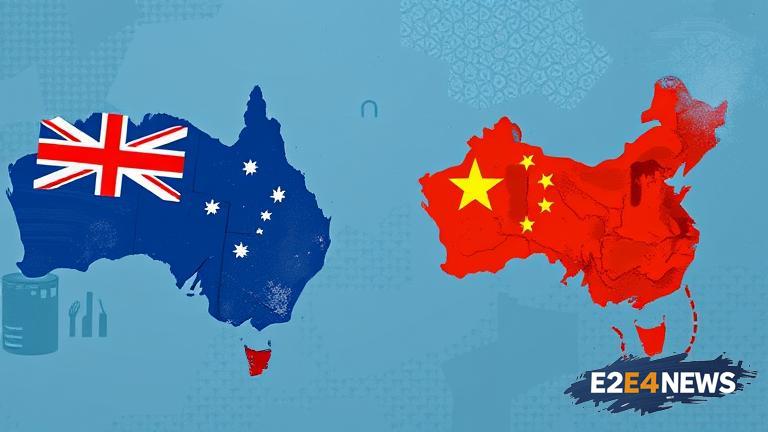The relationship between Australia and China is a multifaceted one, with trade and security tensions playing a significant role in shaping their ties. Despite being major trading partners, the two countries have been at odds over various issues, including security, human rights, and territorial disputes. China is Australia’s largest trading partner, with bilateral trade valued at over $200 billion annually. However, Australia has been increasingly wary of China’s growing military presence in the region and its attempts to exert influence over Australian politics and society. The Australian government has taken steps to counter Chinese interference, including introducing new laws to combat foreign interference and establishing a counter-foreign interference taskforce. Meanwhile, China has been critical of Australia’s stance on various issues, including its support for the United States in the South China Sea and its criticism of China’s human rights record. The security tensions between the two countries have also been fueled by China’s increasing assertiveness in the region, including its military buildup in the South China Sea and its attempts to establish a presence in the Pacific. Despite these tensions, both countries have been keen to maintain their trade relationship, with China being a major market for Australian exports such as iron ore, coal, and agricultural products. However, there are concerns that the trade relationship could be impacted by the security tensions, with some Australian businesses already reporting difficulties in operating in China. The Australian government has also been seeking to diversify its trade relationships, including through the signing of new trade agreements with other countries in the region. The complex relationship between Australia and China has also been influenced by the COVID-19 pandemic, with both countries experiencing significant economic impacts. The pandemic has also highlighted the importance of diversifying trade relationships and reducing dependence on any one market. In recent years, there have been efforts to improve people-to-people ties between Australia and China, including through educational exchanges and cultural events. However, these efforts have been overshadowed by the security tensions and trade disputes. The Australian government has also been critical of China’s treatment of ethnic minorities, including the Uighurs in Xinjiang. The situation in Hong Kong has also been a point of contention, with Australia expressing concern over China’s actions to restrict freedoms in the territory. Overall, the relationship between Australia and China is complex and multifaceted, with trade and security tensions playing a significant role in shaping their ties.
